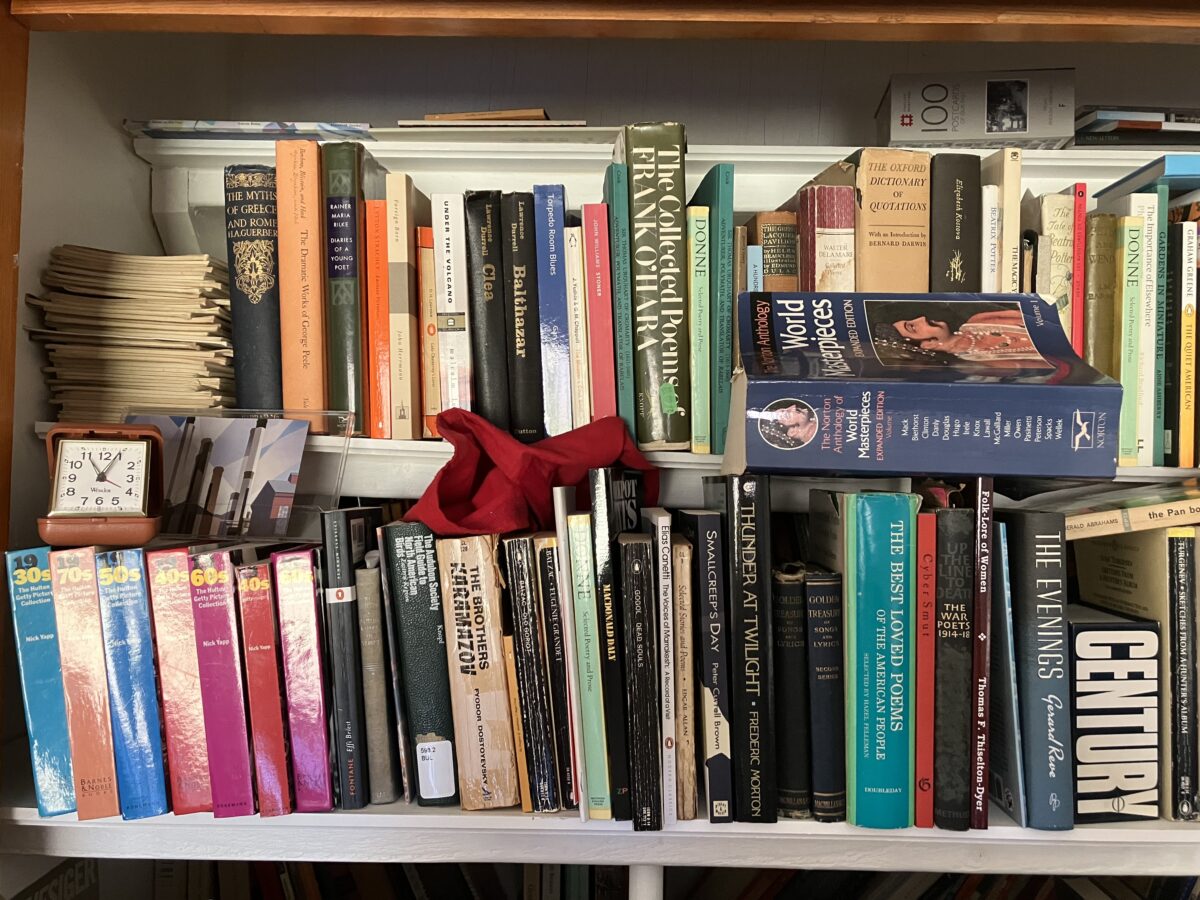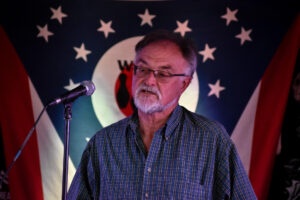Sincere thanks to Roger for the energy and passion he shares in this inspiring interview.
Would you please tell us a little about your writing process?
By all means. A line comes into my head, and I write it down, but before that I doodle with a block of soft graphite lead on a sheet of blue paper—always with the left hand. I am right-handed, so drawing with the left hand means that I am not consciously drawing. This loosens me up. Then I record on a pocket recorder whatever I have written, however short, and put it on repeat. This somehow, and often, gets the next line coming. I keep all the drafts, numbered, and go over them, even after the “final” version is ready. Often an “improved” early version isn’t improved at all. I listen to a lot of Elgar and Ralph Vaughan Williams while trying to write. I take frequent breaks, and dance around to Charli xcx during, would you believe? And sometimes the Ramones.
How do you believe a writer improves? Practice? Mentors? Reading everything? Attending festivals?
I couldn’t possibly say what helps improves anyone else, only what works for me. I think it is in the doing, but yes, also reading. And by reading, I don’t in my case mean reading other poems. I read novels and biographies, and write down memorable phrases. I have had no training in writing whatsoever: I am a retired academic and have always loved literature, but also art. Studying a painting has helped me improve, if indeed I have.
What motivated / motivates you to write?
I have to. Doesn’t any writer feel that way? I never wrote a creative thing until I arrived in America in 1991. Well, we did when we were children, but then the subject “English” changed (this in my childhood in Britain) and we were made (I stress “made”) to write about other people’s writings rather than writing our own creative pieces, which was unarguably better. That was a huge disappointment, and it was never explained.
Do you enjoy writing?
Oh enormously, yes.
What are the most important steps an amateur writer can take?
I don’t know. Being true to oneself, certainly. And just doing it, and remembering that it is yours, and it belongs to no one else.
What is the best piece of advice you have received? Or, what is the best piece of advice you would offer an aspiring writer?
I think I would stick with the reply to the last question, and add that Henry James said something like “discard your best lines.” There is a danger that one can polish and polish and then all the freshness of the original idea is gone. Didn’t Baudelaire say something like “mere literature”?
Who would you say are your literary forebears? Who have you learned the most from?
I like individual poems more than individual poets, if that makes sense. Does it? But if I had to say, then Victorian poets (very much including Matthew Arnold and Tennyson), some of Philip Larkin, the best of Robert Lowell, and Frank O’Hara, but maybe Russian poetry most of all. Marina Tsvetaeva, early Pasternak.
Which books is it most important for an aspiring writer to read?
I really don’t know. I can’t imagine any particular books: it’s more a question of what a writer comes across in life, namely what an aspiring writer likes, and finds somehow sustaining.
Which mistakes have you learned the most from?
Being wedded, over-wedded, to meter, at the expense of the “truth” of a poem. Robert Bly came to the Ashtabula Campus for a conference (on himself), and I drove him back to the airport, and waveringly handed him three efforts. Of the second one, he asked me what I meant by a certain line; and I fumbled away at some sort of reply. Then he said “That’s a bad line, Roger, and you know it.” It was, and I did. I’ve always felt grateful.
What have been your most meaningful or profound experiences as a writer?
Probably starting off one way, and finding I have written something wholly surprising and different.
What are the major benefits of being a writer?
Fulfillment.
Where are the best places to live / visit as a writer?
Where one is comfortable, I suppose, but on the other hand it’s sometimes good to be jolted away from one’s table and chair and coffee mugs. When I was working in Oradea, Romania, I used to sit at a rickety table in the shabby bus station.
Which question do you wish you were asked more?
Would you like another drink?
What do you find most inspiring?
Sleep.
Would you mind sharing a photograph of a part of your bookshelf (or your library) that is meaningful to you? What makes it meaningful to you?
This is a lovely and brilliant thing to be asked. It’s like asking an interview candidate “what are you reading right now?” I shall go into the other room and take a photo right now, without any thought, and then tell you. Back now. I just pointed the phone randomly and snapped the photo. The books are uncatalogued and are higgledy-piggledly and hugger-mugger, as we used to say in England. I like that. I have by no means read all of these books! There are some photograph collections, my grandparents’ clock, a pile of booklets, a postcard by Charles Sheeler, and the bandana of a dog I dearly loved.

Roger Craik is a retired academic who lives in Ohio.

